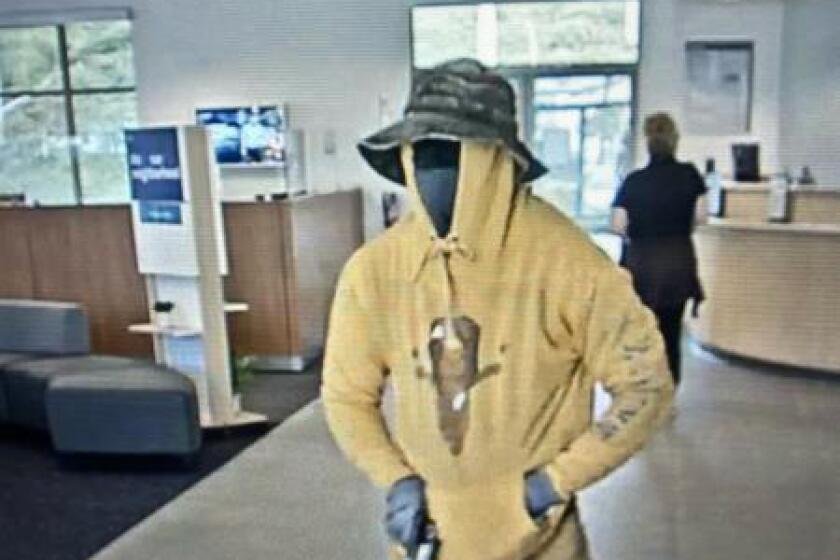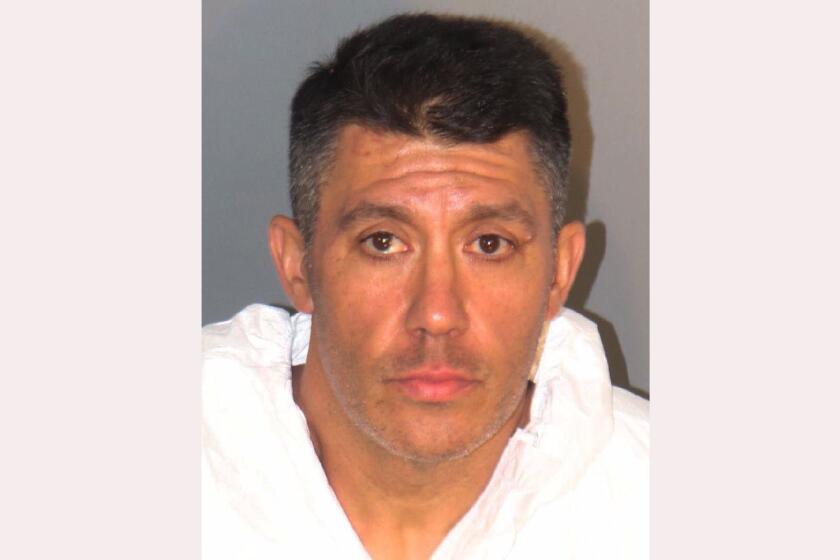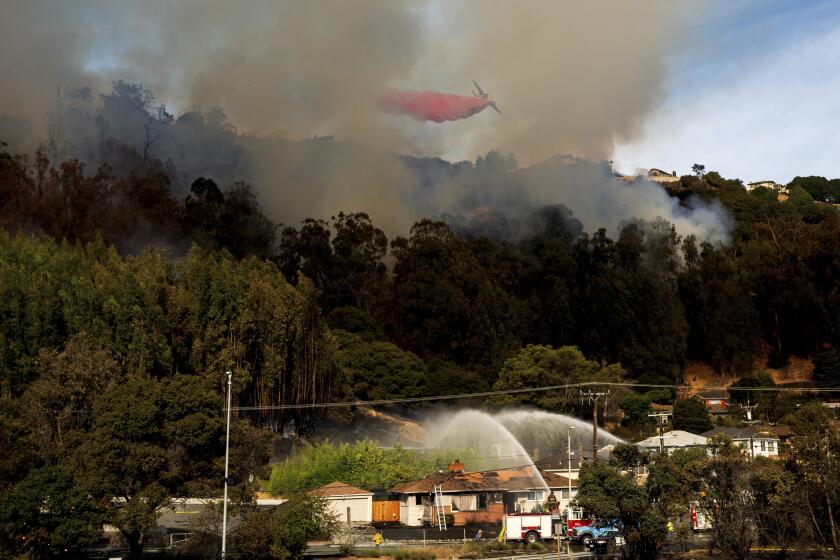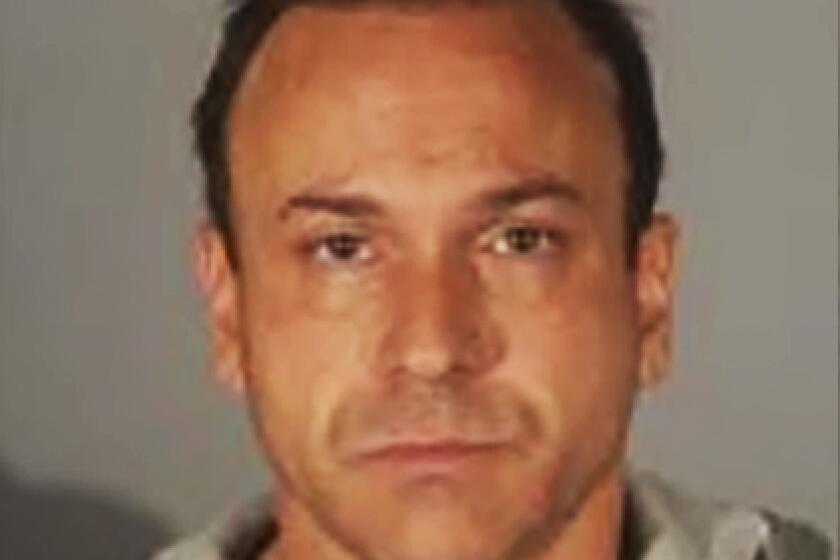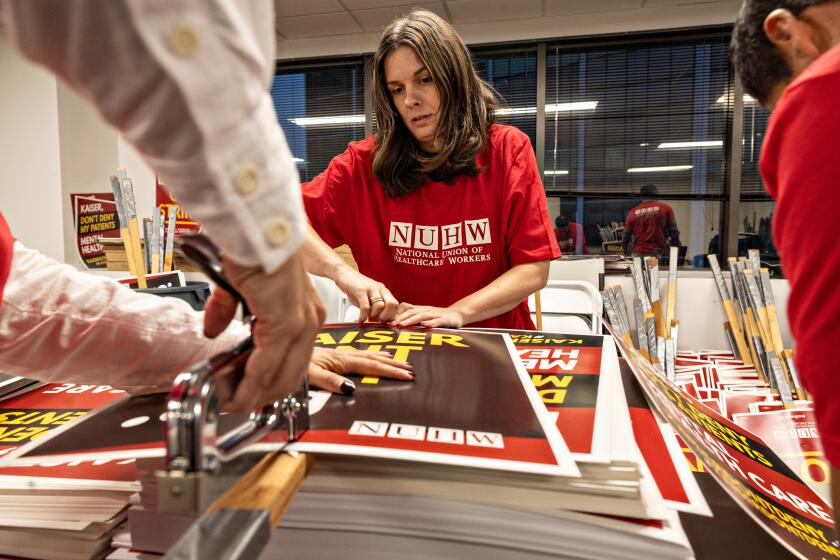He’s Praying on Street He Preyed Upon
When Phillip McCain first attended Academy Cathedral church 10 years ago, his friends and the police thought it was just another hustle.
They knew McCain as one of the wildest gang bangers (gang members) in Inglewood, a veteran criminal unfazed by a shoot-out with police that left him paralyzed and in a wheelchair. His religion was the street; his gods were drugs and violence.
“They thought it was a front,” said McCain, 33. “The police didn’t believe me. My partners said, ‘You’ll be back out here with us, you’ll see.’ ”
But McCain’s main hangout today is the nondenominational Gospel church at Manchester and Crenshaw where he volunteers, counsels young people and studies the Bible. Church officials say he is a potent weapon in their efforts against gangs.
McCain has renounced the street, but he hasn’t left it. When the gang members and the ex-gang members see the man with the big arms and shoulders wheeling himself toward them, they know he has his Bible with him. He won’t preach a sermon if they don’t want to hear it. But he will talk with them for hours in his slow hoarse voice, urging them to change their lives.
“That’s his ministry,” said Academy member Margaret Finney. “When he heard the word of God, it changed his whole heart.”
Even members of the Inglewood Police gang unit, who admit to being devout cynics regardless of denomination, say they’re amazed.
“I can truthfully say I haven’t known him to be involved in any type of criminal activity for the past nine years,” said Officer Lloyd Smith. “It’s hard for me to believe. He used to be a character to be reckoned with.”
‘Wanted to Be a Gangster’
“When I was young I wanted to be a gangster,” McCain recalled this week in an interview at the church. “Businessmen, Slauson, those were the gangs when I was comin’ up in the early ‘60s. Everybody has some kinda image what they want to do. Some people want to be a fireman, a policeman. I didn’t want nothin’ like that.”
By the age of 16, McCain was getting in trouble with the West Side Crips, then a fledgling Los Angeles gang spreading into Inglewood. His family sent him from his northeast Inglewood neighborhood to live with relatives in Venice.
“I went to Venice tryin’ to slow down, ended up getting in more trouble with the Venice Shorelines. Jumpin’ on people, breakin’ into houses. Dealing Red Devils, weed, acid. The police was looking for me, so I had to go back to Inglewood.”
In 1974, McCain and a friend went to a party in South-Central Los Angeles. They were drunk and high. The friend fired shots from a gun he was carrying. When the police came, McCain took the gun and tried to shoot a policeman.
“I put the gun up but it didn’t work, it clicked. Then a policeman shot at me, and I started runnin’.”
The chase lasted an hour. McCain remembers it as a kind of dazed slow-motion: running through dark backyards, hiding, hurdling fences, police everywhere. It ended when he jumped onto a fence in front of an officer who shot him three times at point-blank range.
“I got one in the back, two in the side,” McCain said. “In the hospital, I didn’t know I couldn’t walk. I told them phony names, I was never unconscious. I was ready to leave. As soon as they left the room I took all the hoses outta me, called myself tryin’ to leave. They said, ‘You ain’t goin’ nowhere.’ ”
One of the bullets had struck his spine.
McCain spent more than a year in jail for an unrelated robbery and assault on the police officer. He was released in 1976.
Neither jail time nor being crippled had changed his attitude.
“I didn’t learn. I started hangin’ on the streets, gettin’ high with the fellas. Giving ideas on how to pull off robberies and make some money.”
“He was smart, cocky,” Smith said. “Those are the ones you really have to watch. He was something of a leader, believe it or not.”
McCain would hold weapons and drugs for his accomplices because police were less likely to search someone in a wheelchair. He planned robberies and burglaries, sometimes acting as a lookout. He earned “a hard name,” gaining respect even from gang rivals with exploits such as the attempted burglary of a neighbor’s house.
“They thought I was outta my mind,” McCain said.
One of McCain’s hangouts in 1977 was a street corner on Crenshaw across from Academy Cathedral. He caught the attention of Gladys Negal, one of several women in the congregation bold enough to go on gang turf looking for converts.
“We were ‘witnessing’ young people, trying to get them to come to the Lord,” said Margaret Finney, Negal’s sister. (Negal, who is visiting relatives in Texas and Louisiana, could not be reached.)
“Gladys said, ‘There’s something about that young man in the wheelchair. He always has a big smile.’ She said she knew he had a lot of love in him. Phillip had his little gang around him, he was flirtin’ at her. She walked up to him and told him he needed to be saved.”
The challenge from the 29-year-old Negal caught McCain off-guard. It also helped, as Finney says, that “she was a very attractive woman.”
“I thought I was maybe gonna get some action, you know what I’m sayin’?” McCain recalled. “I went to church that Friday. I checked it out. People was very friendly, showing their love, you know. I felt something I never felt before. I was sittin’ up there, real high (on drugs). When the preacher got to preachin’ it seemed like he was talkin’ just to me.”
The change was not instantaneous.
But the congregation was struck by McCain’s growing devotion to the church. He soon took full responsibility for the Academy “Faithline,” praying for telephone callers and reading to them from the Bible. His gentleness and size attracted children, whom he tried to steer away from trouble, church members say.
“God really took ahold of that boy,” Hart said. “He’s been a real help to the young people here.”
Backslid in ’79
In 1979, McCain disappeared from Academy Cathedral for several months.
“Backsliding,” he calls it. He sold and used drugs in his old haunts, but he couldn’t get the church out of his head. Especially because Negal and her sister would not let him.
“I was tryin’ to dodge ‘em,” McCain says. “They’d come over to my house lookin’ for me, they stuck with me. I was to the curb doin’ drugs, my life was down in the dumps. One day I heard this voice tell me it was time to go back. I went back that Sunday.”
Eight years later, Hart trusts McCain with keys to the church buildings. He lives on a Social Security disability pension, receiving occasional money from the church for his long hours of volunteer work. He attends all-night prayer meetings. He has told his story on Christian television.
Academy Cathedral is attempting to counteract gang activity with a “Kops and Kids” program in which officers mix sports and games with counseling on drugs, gangs and health issues. Hart and Assistant Pastor Luis DeJesus say McCain is an important asset in the program, a link to the street world.
Respect of Gangs
“He lets me know what’s going on,” Hart said. “I can depend on him. He knows every gang member and they know him. They seem to respect him. If you want to know what’s going on in the area, just ask Phillip.”
“He’s still a homeboy,” said Smith, referring McCain’s acceptance by gang members. “I see him out there with the fellas, they still talk to him. But now he’s trying to get them to come to church.”
McCain views his informal street ministry as his calling. The going is tough, especially when many teen-age gang members are drug barons who drive flashy pickup trucks with cellular phones, carry Uzi machine guns and wear beepers as badges of their new wealth.
“You got to talk to them one-on-one,” McCain said. “I’ll sit up on a corner and talk to a brother for two, three hours. He’ll pay attention then. If he don’t wanna talk about church I’ll talk to him about life. I used to make money like that, too. But I’ll tell him it’s a temporary thing. It’s gonna fade away.”
McCain also pressures old friends, ex-gang members who are still doing drugs and petty crimes. They are the ones who have managed to avoid death or prison but are still just hanging out. Several have shown up for the weekly Kops and Kids functions at his invitation.
“I’m constantly on ‘em,” McCain said. “You can see a slow change. They’re tired of the life style.”
McCain said he doesn’t see an alternative to his brand of “spiritual warfare.”
“Even the police admit it, the gang stuff is outta hand. They done tried everything else, the only thing they can come up with is Jesus. A lotta people just say do away with the gang bangers, but I can’t do that. I gotta have compassion. Some of the bangers, they’ll come up to me and say, ‘Phil, pray for me.’ ”
More to Read
Sign up for Essential California
The most important California stories and recommendations in your inbox every morning.
You may occasionally receive promotional content from the Los Angeles Times.





